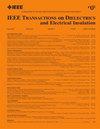变压器溶解气体分析浅学习与深度学习的再思考
IF 2.9
3区 工程技术
Q2 ENGINEERING, ELECTRICAL & ELECTRONIC
IEEE Transactions on Dielectrics and Electrical Insulation
Pub Date : 2025-01-06
DOI:10.1109/TDEI.2025.3526080
引用次数: 0
摘要
电力变压器溶解气体分析(DGA)多年来一直受到人们的关注。大量的机器学习技术被用于DGA的故障分类。近年来,深度学习(DL)技术被用于处理DGA问题,但与浅学习(SL)算法相比,其性能并没有显著提高。为了进行全面的调查,本文测试了流行的SL算法,并在四个不同的DGA数据集上报告了DL算法。结果表明,SL算法具有高效的DGA分析能力,而DL算法可能没有预期的那么好。除了结构复杂和需要调优的参数众多之外,DL算法的性能甚至可能比SL算法差。本工作可为今后DGA算法的发展提供参考。本文章由计算机程序翻译,如有差异,请以英文原文为准。
Rethinking Shallow and Deep Learnings for Transformer Dissolved Gas Analysis: A Review
Dissolved gas analysis (DGA) of power transformers has attracted attention for years. Extensive machine learning techniques have been adopted to DGA for fault classification. Recently, deep learning (DL) techniques have been brought to deal with DGA issues, while their performances are not significantly improved compared to shallow learning (SL) algorithms. For a comprehensive investigation, this article tests popular SL algorithms and reports DL algorithms on four different DGA datasets. The results show that SL algorithms have efficient capacity for DGA analysis, while DL algorithms may not as great as they expect. In addition of complex structure and numerous parameters to tune, DL algorithms may even perform worse than SL algorithms. This work can be a reference for future DGA algorithm development.
求助全文
通过发布文献求助,成功后即可免费获取论文全文。
去求助
来源期刊
CiteScore
6.00
自引率
22.60%
发文量
309
审稿时长
5.2 months
期刊介绍:
Topics that are concerned with dielectric phenomena and measurements, with development and characterization of gaseous, vacuum, liquid and solid electrical insulating materials and systems; and with utilization of these materials in circuits and systems under condition of use.

 求助内容:
求助内容: 应助结果提醒方式:
应助结果提醒方式:


